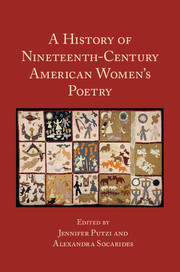Book contents
- Frontmatter
- Contents
- List of Illustrations
- List of Contributors
- Acknowledgments
- Introduction: Making History: Thinking about Nineteenth-Century American Women's Poetry
- PART I 1800–1840, AMERICAN POESIS AND THE NATIONAL IMAGINARY
- 1 Claiming Lucy Terry Prince: Literary History and the Problem of Early African American Women Poets
- 2 Before the Poetess: Women's Poetry in the Early Republic
- 3 The Passion for Poetry in Lydia Sigourney and Elizabeth Oakes Smith
- 4 Album Verse and the Poetics of Scribal Circulation
- 5 Presents of Mind: Lydia Sigourney, Gift Book Culture, and the Commodification of Poetry
- 6 The Friendship Elegy
- 7 Gendered Atlantic: Lydia Sigourney and Felicia Hemans
- PART II 1840–1865, UNIONS AND DISUNIONS
- PART III 1865–1900, EXPERIMENT AND EXPANSION
- Suggested Further Reading
- Index
3 - The Passion for Poetry in Lydia Sigourney and Elizabeth Oakes Smith
from PART I - 1800–1840, AMERICAN POESIS AND THE NATIONAL IMAGINARY
Published online by Cambridge University Press: 21 January 2017
- Frontmatter
- Contents
- List of Illustrations
- List of Contributors
- Acknowledgments
- Introduction: Making History: Thinking about Nineteenth-Century American Women's Poetry
- PART I 1800–1840, AMERICAN POESIS AND THE NATIONAL IMAGINARY
- 1 Claiming Lucy Terry Prince: Literary History and the Problem of Early African American Women Poets
- 2 Before the Poetess: Women's Poetry in the Early Republic
- 3 The Passion for Poetry in Lydia Sigourney and Elizabeth Oakes Smith
- 4 Album Verse and the Poetics of Scribal Circulation
- 5 Presents of Mind: Lydia Sigourney, Gift Book Culture, and the Commodification of Poetry
- 6 The Friendship Elegy
- 7 Gendered Atlantic: Lydia Sigourney and Felicia Hemans
- PART II 1840–1865, UNIONS AND DISUNIONS
- PART III 1865–1900, EXPERIMENT AND EXPANSION
- Suggested Further Reading
- Index
Summary
One striking development in poetry of the nineteenth century is its intense idealization of poetry. Poets before and since wrote and would continue to write on the subject, but not, it would seem, with the same fervor. Particularly in the first half of the century in the United States, reverence for the muse can sometimes seem cult-like in emphasis. Unknown to prose, the exaltation of the medium pervades the theories of Edgar Allan Poe and Ralph Waldo Emerson, who take their inspiration from High Romantic texts such as Shelley's “A Defence of Poetry.” Women poets of the time did not have occasion to issue prose manifestoes along the lines of Eureka or “The Poet,” but in laying a wreath at the shrine of Poetry they, too, were no less impassioned and ambitious in their claims for verse. In the publications of Lydia Sigourney, the country's bestselling poet through the 1820s and 1830s, and Elizabeth Oakes Smith, author of the bestselling poem “The Sinless Child,” first published in 1842, the link between poetry and a supreme Ideality is especially strong, albeit for very different reasons.
To explore such a link in these two authors is to ask, ultimately, what it is that they value about poetry. To the extent that such a question is entertained among scholars today, it tends to attract thematic considerations, as when Sigourney's commitment to republican motherhood is emphasized as a key motivation for her writing or when “The Sinless Child” is read as an attempt to reconcile Christianity and transcendentalism. But this privileging of thematic content, while not unimportant, can only take us so far in understanding the author's relationship to her writing, and, indeed, after a certain point it runs the risk of reducing the verse to an instrument for the propagation of ideas or the encoding of messages. That Sigourney and Oakes Smith had a different understanding represents a point of departure for the discussion that follows. In Sigourney's writing the glorification of poetry is hidden in plain sight, intangibly but unmistakably conveyed through a style of rhetorical address whose manner draws upon an earlier period of literary history. In Oakes Smith, born almost a generation after Sigourney, the same glorification becomes a considerably more vexed affair that dramatizes a conflicted, often anguished relation to poetic form and the promises it seemed to hold.
- Type
- Chapter
- Information
- A History of Nineteenth-Century American Women's Poetry , pp. 53 - 67Publisher: Cambridge University PressPrint publication year: 2016

